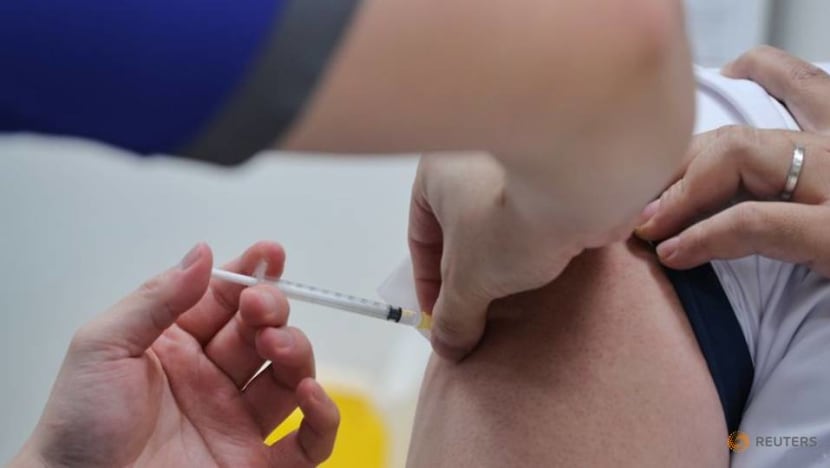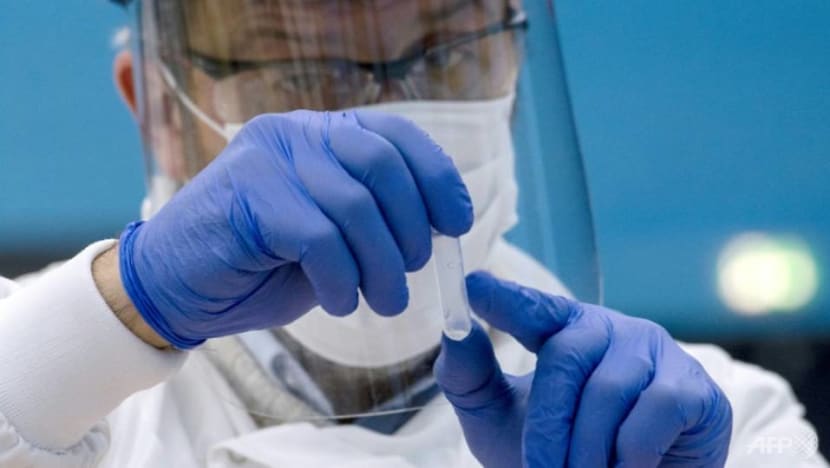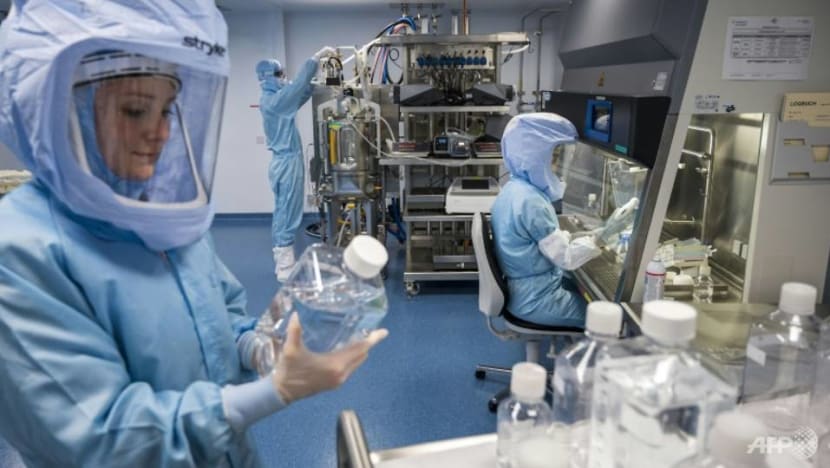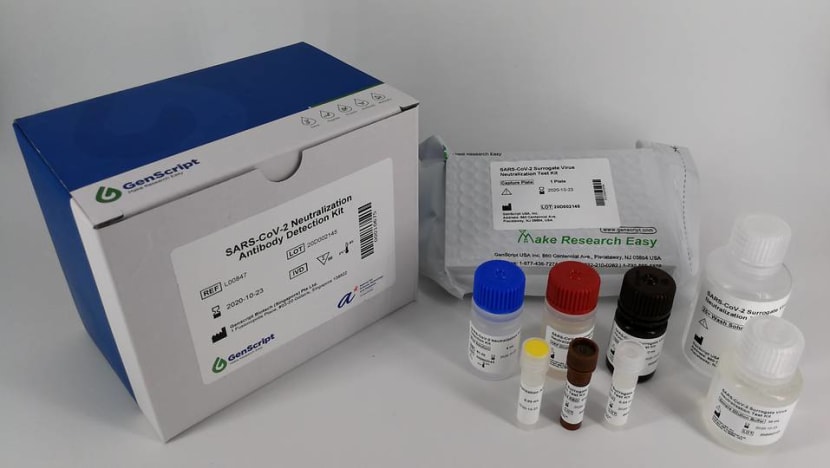commentary Commentary
Commentary: Booster shot for COVID-19 - not everyone needs it
Antibody tests to determine who needs a booster shot could help prioritise vaccinations, especially in the face of potentially limited supplies, says infectious diseases expert Dr Leong Hoe Nam.

A healthcare worker receives the coronavirus disease (COVID-19) vaccine at the National Centre for Infectious Diseases (NCID) in Singapore December 30, 2020. Lee Jia Wen/Ministry of Communications and Information/Handout via REUTERS
SINGAPORE: Within just 18 months of the first COVID-19 case being reported in Wuhan, more than 1.25 billion vaccine doses have been administered in 174 countries so far, roughly averaging 19.4 million doses a day – the equivalent of vaccinating more than three times the population of Singapore, daily.
Some countries like Israel, the United States and the United Kingdom (UK) lead the charge. Two-thirds of UK’s population has received the first dose so far and nearly a third have received both doses.
Singapore’s ramping up too, with 1.2 million people, or about 20 per cent of the population, completing the full vaccine regimen and 1.8 million people receiving at least one vaccine shot as of May 9, Health Minister Gan Kim Yong revealed in Parliament on Tuesday (May 11).
Unless we can accelerate the rollout of vaccines, it should come as no surprise that at current vaccination rates, it could be several years before the world achieves herd immunity against SARS-CoV-2.
READ: Commentary: Five pandemic lessons we have learnt that should tide us over any surge in cases
The world marches out of COVID-19 at the pace of the slowest nation. So, the World Health Organization (WHO) has rightly emphasised the need for international cooperation in vaccination campaigns because a global pandemic requires global efforts to end it.
THE SPREAD OF NEW VARIANTS
With countries at different stages of their vaccination programmes and a few yet to begin, we face significant challenges in trying to protect the world’s population from this infection.
As the coronavirus continues to circulate, infecting people who have not yet been vaccinated, mutants can spread and more variants are likely to develop. Some of these variants could even challenge the immunity provided by vaccines widely deployed in other countries.
Mutations are intrinsic to viruses - they occur because viruses are constantly replicating, making copies of themselves. They inherently introduce errors, making their progeny different, helping the viruses to mutate and spread more effectively.
In just over a year since the virus was formally identified, there are now thousands of genetic variants of SARS-CoV-2 circulating across the world. Most of these mutations are insignificant. Some may even limit the virus, but successful mutants make it more transmissible or evade existing immune mechanisms.
The UK, South Africa, Brazil and India variants are notably differentiated by changes to their spike protein - the part of the virus which attaches to receptors on human cells and gains entry inside. This is the target for most of the world's vaccines.

The UK strain is about 70 per cent more infectious, while the India, South Africa and Brazil variants have mutations that increase transmissibility and evade previous immunity. Tracking these existing or new variants are of paramount importance. It helps predict new waves of infection allowing resource planning.
Our knowledge about these variants therefore needs to be constantly updated. Last week, Public Health England declared that a variant first identified in India – known as B16172 - is a “variant of concern” due to evidence of greater transmissibility.
Weeks earlier, the Indian consortium INSACOG had flagged the possibility of a surge in infections, even before India was hit by a second wave of COVID-19.
Success in tracking variants largely depends on our ability to detect the early signs of their emergence in communities which is difficult in large populations, especially if they’re spread out over expansive geographies. Real-time knowledge sharing between trans-national scientific networks is critical to keep up with the mutations.
Beyond governments, collaborations between industry, academic and scientific institutions will prove crucial in setting up an early warning system.
READ: Commentary: Flaring tempers and public incidents – are we losing it because of COVID-19?
For instance, about a year into this pandemic, healthcare company Abbott activated a first-of-its-kind global scientific network, collaborating with leading institutions in North America, South America, Africa and Asia, to detect and rapidly respond to current and future pandemic threats.
SUPPRESSING THE VARIANTS’ SPREAD
The variants’ rapid advance in recent weeks, across some countries, underscores the importance of wearing masks, safe distancing and practicing good hand hygiene in suppressing their spread, even in the face of a successful vaccination programme.
These public health measures form our first line of defence against the development of new mutations and critically, they can help buy us time to roll-out vaccination programmes across the world.

Currently approved vaccines offer a significant degree of protection against variants. Early scientific data suggests development of some herd immunity. Even in vaccine failures - individuals who fall sick with detectable virus after vaccination - there was no reported secondary spread, albeit in a small group of 22 vaccinated people in Chicago.
As more and more people are vaccinated or recover from a SARS-CoV-2 infection, our collective immunity rises. However, the verdict on the effectiveness of each vaccine to defend against the variants differs and remains wide open.
READ: Commentary: India’s second COVID-19 wave threatens global supplies of vaccines
As the variants spread and new mutations emerge, scientists have expressed confidence that they can deploy, and even re-engineer, existing vaccines to better tackle them.
Vaccine makers such as Pfizer and Moderna have indicated that people may need a third dose after a few months, or receive a booster shot periodically, to help maintain immunity.
This creates a dilemma in the immediate term – whether vaccine suppliers should focus on protecting people who have not yet been vaccinated or giving a booster shot to those who have already been vaccinated. Vaccinating as many people as possible should always be our top priority because some protection is better than none.
WHO GETS THE VACCINE?
There are options however to manage these trade-offs.
With global demand for vaccines far outstripping supply, lifting intellectual property protections would boost vaccine availability and remove barriers to equitable access. That said, making vaccines is a complex endeavour. Increasing supply will take some months, if not years, even if vaccines are produced at warp speed.
German bio-tech company BioNTech announced on Monday (May 10) it is setting up a manufacturing plant in Singapore to produce vaccines for Southeast Asia, but the facility will not be operational until 2023.

But we don’t have to despair as there’s another option. Until supplies can be ramped up, another tool that could be used to boost vaccine access, to some degree, is quantitative antibody testing.
Antibodies are infection-fighting proteins produced to defend against a viral attack, while vaccines trigger the creation of antibodies.
There are several types of antibodies but simplistically, the quantity and presence of some specific antibodies in the body can help doctors determine the level of immunity provided by a vaccine.
READ: Commentary: Does the emergence of COVID-19 variants mean a protracted battle with the pandemic?
The level of immune response generated by the vaccine or the virus may be different in different people with different immunity.
Quantitative antibody tests, made by diagnostic companies such as Siemens, Abbott and Roche are specifically designed to detect the presence of these particular antibodies that can help determine a person’s level of immunity.
Whereas the Singapore-developed cPass test can detect whether a person has neutralising antibodies which can prevent the coronavirus from infecting a patient's cells.

The key is that these antibody tests can measure immune response and provide insights for doctors to understand how an individual can cope with a potential coronavirus infection.
Antibody testing therefore has great value in helping to prioritise people who need the third dose the most by identifying those with low levels of immunity.
Admittedly, these simple tests do not measure other defence cells such as T cells which could also kick-in and provide protection. Such tests are laborious and difficult to interpret and are usually left in the realms of research.
READ: Commentary: US-backed COVID-19 vaccine patent waiver has larger implications
By prioritising who receives the third booster shot, we can ensure that no dose of the vaccine is unnecessarily administered to a person who may have adequate immunity.
This would minimise the need to administer the booster en masse, freeing up critical infrastructure and resources, and helping to achieve greater vaccine equity. This could become a key tool in helping the world achieve herd immunity faster by deploying vaccines where they are most needed.
Judicious antibody testing can therefore be an able ally in the race to vaccinate the world. With every additional person that’s vaccinated earlier, the playground for the virus shrinks, inch by inch.
Dr Leong Hoe Nam is an infectious disease specialist at the Rophi Clinic at Mount Elizabeth Novena Hospital.














